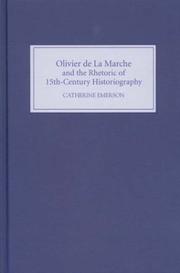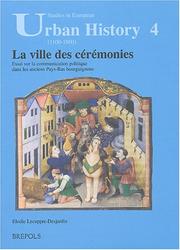| Listing 1 - 10 of 13 | << page >> |
Sort by
|
Book
Year: 2004 Publisher: Project Gutenberg
Abstract | Keywords | Export | Availability | Bookmark
 Loading...
Loading...Choose an application
- Reference Manager
- EndNote
- RefWorks (Direct export to RefWorks)
Charles --- Duke of Burgundy --- 1433-1477
Book
Year: 2004 Publisher: Project Gutenberg
Abstract | Keywords | Export | Availability | Bookmark
 Loading...
Loading...Choose an application
- Reference Manager
- EndNote
- RefWorks (Direct export to RefWorks)
Charles --- Duke of Burgundy --- 1433-1477
Book
ISBN: 2905965991 9782905965998 Year: 2004 Publisher: Dijon : E.U.D. (Editions universitaires de Dijon),
Abstract | Keywords | Export | Availability | Bookmark
 Loading...
Loading...Choose an application
- Reference Manager
- EndNote
- RefWorks (Direct export to RefWorks)
Cultural property --- Congresses. --- Burgundy (France) --- Bourgogne (France) --- Civilization --- Civilisation --- Congrès --- Bourgogne --- --Patrimoine --- --Colloque --- --2002 --- --Dijon --- --actes --- --Cultural property --- Congrès --- Cultural property - France - Burgundy - Congresses. --- Patrimoine --- Colloque --- Dijon --- Archeologie --- France
Book
Year: 2004 Publisher: Project Gutenberg
Abstract | Keywords | Export | Availability | Bookmark
 Loading...
Loading...Choose an application
- Reference Manager
- EndNote
- RefWorks (Direct export to RefWorks)
France --- History --- Louis XI --- 1461-1483 --- Fiction --- Charles --- Duke of Burgundy --- 1433-1477 --- King of France --- 1423-1483
Book
Year: 2004 Publisher: Project Gutenberg
Abstract | Keywords | Export | Availability | Bookmark
 Loading...
Loading...Choose an application
- Reference Manager
- EndNote
- RefWorks (Direct export to RefWorks)
France --- History --- Louis XI --- 1461-1483 --- Fiction --- Charles --- Duke of Burgundy --- 1433-1477 --- King of France --- 1423-1483

ISBN: 1843830523 9781843830528 Year: 2004 Publisher: Woodbridge Boydell
Abstract | Keywords | Export | Availability | Bookmark
 Loading...
Loading...Choose an application
- Reference Manager
- EndNote
- RefWorks (Direct export to RefWorks)
Olivier de La Marche's Memoires of events in Burgundy in the latter half of the fifteenth century raise many questions for historians. Written piecemeal over a period of fifty years, individual passages must first be dated; then, questions of style and genre can be addressed: are the Memoires memoirs in the modern understanding of the term? How far can the text be read as autobiography? Is La Marche the eyewitness he seems? The relationship between the Memoires and the literary culture surrounding the Burgundian court is also examined, followed by examination of three key aspects of the Memoires: their status as didactic literature, the place accorded to religion (and within that, to Franciscan friars), and the presentation of combat. Far from being a naive and inaccurate account, the Memoires emerge as having specific polemical purposes, the polemic often strengthened by what have traditionally been read as confused chronology and material errors.
Marche, de la, Olivier --- La Marche, Olivier de, --- Burgundy, House of. --- Burgundy, House of --- 930.21 "04/14" --- 940.19 --- 930.21 "04/14" Historiografie: Middeleeuwen --- Historiografie: Middeleeuwen --- 940.19 Geschiedenis van Europa:--1270-1492 --- Geschiedenis van Europa:--1270-1492 --- Burgundy (France) --- Europe --- History. --- History --- Old French literature --- History as a science --- Historians --- Historiens --- France --- Bourgogne (France) --- Historiography --- Historiographie --- Histoire --- La Marche, Olivier de --- Burgundy [House of ] --- 476-1492 --- Historiography. --- La Marche, Olivier de, - ca. 1426-1502. - Memoires d'Olivier de La Marche --- Burgundy (France) - History --- Europe - History - 476-1492 --- LA MARCHE (OLIVIER DE), CA. 1426-1502 --- BOURGOGNE (FRANCE) --- EUROPE --- HISTORIOGRAPHIE --- MEMOIRES --- HISTOIRE --- 15E SIECLE --- FRANCE
Book
ISBN: 2711847284 9782711847280 Year: 2004 Publisher: Dijon : Musée des beaux-arts,
Abstract | Keywords | Export | Availability | Bookmark
 Loading...
Loading...Choose an application
- Reference Manager
- EndNote
- RefWorks (Direct export to RefWorks)
Champmol, Chartreuse --- Bourgondische Nederlanden --- History of France --- Art --- patronage --- History of the Low Countries --- John the Fearless --- Philip the Bold --- Burgundy --- Art, French --- Philip, --- John, --- Art patronage --- Mécénat --- --Bourgogne --- --Exposition --- --2004 --- --Dijon --- --Cleveland --- --Philippe, --- Jean, --- XIVe-XVe s., --- Art funéraire --- Château --- Histoire de l'architecture --- Histoire de l'art --- Histoire de la sculpture --- Manuscrit --- Baumetz, Jean de --- Broederlam, Melchior --- Malouel, Jean --- Sluter, Claus --- Belgique --- Pays-bas --- Philip the Bold, --- John the Fearless, --- Art [Medieval ] --- France --- Burgundy (France) --- Exhibitions --- Philip --- John --- Art, French - France - Burgundy - 14th century - Exhibitions --- Art, French - France - Burgundy - 15th century - Exhibitions --- Exposition --- XIVe-XVe s., 1301-1500 --- Philippe, 1342-1404 --- Jean, 1371-1419 --- Bourgogne --- Dijon --- Cleveland
Book
ISBN: 2213599351 9782213599359 Year: 2004 Publisher: Paris Fayard
Abstract | Keywords | Export | Availability | Bookmark
 Loading...
Loading...Choose an application
- Reference Manager
- EndNote
- RefWorks (Direct export to RefWorks)
Charles the Bold --- Charles, --- Burgundy (France) --- France --- Bourgogne (France) --- Kings and rulers --- Biography. --- History --- Rois et souverains --- Biographies --- Histoire --- CHARLES LE TEMERAIRE (DUC DE BOURGOGNE), 1433-1477 --- BIOGRAPHIE

ISBN: 2503522564 9782503522562 Year: 2004 Volume: 4 Publisher: Turnhout Brepols
Abstract | Keywords | Export | Availability | Bookmark
 Loading...
Loading...Choose an application
- Reference Manager
- EndNote
- RefWorks (Direct export to RefWorks)
Les cérémonies bourguignonnes : révélations protéiformes des valeurs esthétiques d'une vie culturelle rayonnante ou instrument politique d'un Etat en marche ? C'est autour de cette question que l'étude des cérémonies organisées dans le cadre des villes des Pays-Bas bourguignons a permis d'expliquer les fondements et de souligner la maîtrise d'un instrument essentiel du pouvoir : la communication symbolique. La rencontre exceptionnelle entre le prince et les sociétés urbaines s'est révélée un champ d'analyse parfait pour qui veut comprendre les processus d'acculturation et les tentatives d'intégration auxquels s'est attachée la cour de Bourgogne tout au long du XVe siècle. L'attention portée sur neuf villes que sont Arras, Saint-Omer, Douai, Lille, Gand, Bruges, Valenciennes, Mons et Bruxelles a donné à ce travail l'ampleur nécessaire pour appréhender les mécanismes de gouvernement et plus précisément les politiques de séduction à l'échelle de l'Etat. Ainsi, condamnés à une itinérance incessante, les ducs ont bénéficié d'une culture festive préexistante, d'un solide réseau de communication et d'une attente toujours pressante de la part du peuple des villes, pour mettre en scène cette apparition extraordinaire de l'Etat, rappelant inlassablement leur légitimité et leur autorité. Toutefois, progressivement, la montée en puissance des compagnies festives urbaines et la volonté d'afficher des intérêts propres a rappelé que l'espace public est avant tout un forum où le partage du pouvoir peut-être discuté ou tout au moins donner l'illusion d'être discuté. La richesse des allégories et des jeux dramatiques a placé l'ambiguïté du discours symbolique au service d'ambitions politiques distinctes, soulignant la force de la mémoire collective et des enjeux identitaires. L'Etat bourguignon s'est ainsi révélé un Etat moderne en marche qui utilise son espace public pour diffuser avec plus ou moins d'habileté les progrès de son développement tandis que les villes ont trahi leur attachement viscéral à un modèle seigneurial où la conquête de privilèges, le désir de paix et la prospérité garantie priment. Les cérémonies, qui accompagnent plus qu'elles ne fondent la construction de l'Etat, ont souligné l'importance à la fois de la propagande et de la négociation dans le gouvernement de ces terres du Nord
History of the Low Countries --- anno 1400-1499 --- anno 1500-1599 --- Coutumes --- France ; histoire du Moyen Age --- Frankrijk ; geschiedenis van de Middeleeuwen --- Gebruiken --- Communication in politics --- Cities and towns, Medieval --- Festivals --- Rites and ceremonies --- City and town life --- Communication politique --- Villes médiévales --- Fêtes --- Rites et cérémonies --- Vie urbaine --- History --- Histoire --- Burgundy, House of --- Burgundy (France) --- Belgium --- Bourgogne (France) --- Belgique --- Political customs and rites --- 911.375 <09> <01> --- 307.7609493 --- Steden. Studie van stedelijke vestiging. Geografie van steden. Stadsgeografie--Geschiedenis van ...--Bibliografieën. Catalogi --- Social sciences Urban communities Belgium --- Villes médiévales --- Fêtes --- Rites et cérémonies --- Customs and rites, Political --- Political rituals --- Rituals, Political --- Manners and customs --- Political anthropology --- Days --- Anniversaries --- Fasts and feasts --- Pageants --- Processions --- Political communication --- Political science --- History. --- Communication in politics - Flanders - History - To 1500 --- Communication in politics - France - Burgundy - History - To 1500 --- Political customs and rites - Flanders - History - To 1500 --- Political customs and rites - France - Burgundy - History - To 1500 --- Festivals - Flanders - History - To 1500 --- Festivals - France - Burgundy - History - To 1500 --- DUCS DE BOURGOGNE --- PAYS-BAS BOURGUIGNONS --- RITES ET CEREMONIES POLITIQUES --- POLITIQUE ET GOUVERNEMENT --- 14E-15E SIECLES --- INSTITUTIONS --- PAYS-BAS
Book
ISBN: 9054873620 9789054873624 Year: 2004 Volume: 4 Publisher: Brussel VUBPRESS
Abstract | Keywords | Export | Availability | Bookmark
 Loading...
Loading...Choose an application
- Reference Manager
- EndNote
- RefWorks (Direct export to RefWorks)
De verkiezingen van 18 mei 2003 vormden een mijlpaal voor het aantal verkozen vrouwen in België, vooral in de Kamer. Hun aantal steeg er van 19% bij de vorige verkiezingen naar 35%. In 2003 werd ook een nieuwe quotawet van kracht waardoor kieslijsten evenveel vrouwelijke als mannelijke kandidatien moesten bevatten en de eerste drie plaatsen op de lijst niet door leden van eenzelfde geslacht mochten worden ingenomen. Aansluiten op de verkiezingen organiseerde het Centrum voor Vrouwenstudies van de VUB vier debatavonden over sekseverhoudingen in de politiek. De verslagen van deze gesprekken zijn nu gebundeld in 'Vrouwen vertegenwoordigd, Wetstraat gekraakt?'. Onder meer de volgende vragen kwamen hierbij aan bod: welke impact hebben kiesstelsels op de man-vrouwverhoudingen onder kandidaten en verkozenen. Zijn kiesstelsels gender neutraal? Welke weerslag heeft een groter aantal vrouwelijke verkozenen op het beleid? Bestaat er zoiets als een kritische massa vrouwelijke afgevaardigden die garandeert dat de belangen en behoeften van vrouwen aan bod komen? Hoe werden vrouwen de laatste honderd jaar gepercipieerd en vertegenwoordigd door de Belgische politici? Hoe wordt politieke vertegenwoordiging vanuit een feministische invalshoek bekeken? Wat houdt een genderperspectief op het thema vertegenwoordiging precies in?
Burgundy, Dukes of. --- Burgundy (France) --- History. --- Binnenlandse politiek --- Bestuurder --- Vrouw --- Positie van de vrouw --- Women --- Emancipatie. --- Vrouw: politiek. --- Political activity --- Political philosophy. Social philosophy --- Sociology of the family. Sociology of sexuality --- Great Britain --- Belgium --- Femmes --- Activité politique --- 324 --- 396.9 <493> --- emancipatie --- gender --- politiek --- #SBIB:316.346H24 --- #SBIB:323H521 --- #SBIB:323H522 --- 657 Vrouwenemancipatie --- #A0406A --- Human females --- Wimmin --- Woman --- Womon --- Womyn --- Females --- Human beings --- Femininity --- 396.9 <493> Vrouw en politiek--België --- Vrouw en politiek--België --- 324 Verkiezingen --algemeen --- Verkiezingen --algemeen --- 301.17 --- 159.91 --- 32 --- Positie van de vrouw in de samenleving: politiek --- Belgische politieke participatie en socialisatie --- Belgische elite en pacificatie --- Feminism --- Parity democracy --- Politics --- Political participation --- Theory --- Elections --- Book
| Listing 1 - 10 of 13 | << page >> |
Sort by
|

 Search
Search Feedback
Feedback About UniCat
About UniCat  Help
Help News
News